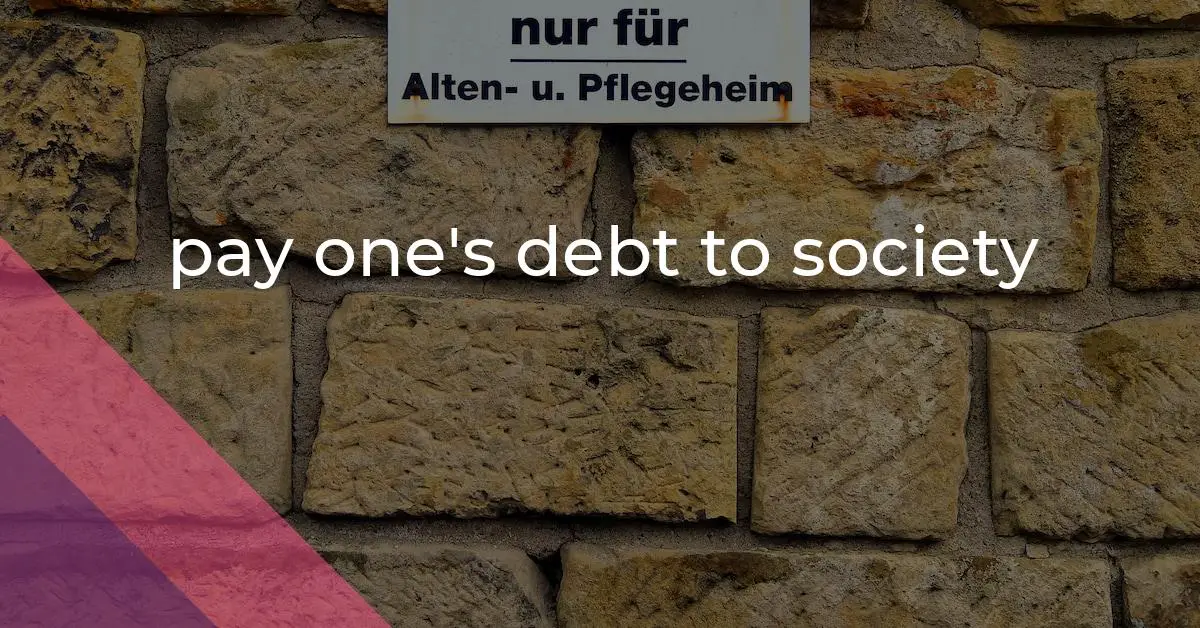pay one’s debt to society: Idiom Meaning and Origin
What does ‘pay one's debt to society’ mean?
The idiom "pay one's debt to society" means to serve a punishment or make amends for a wrongdoing committed in order to satisfy the law and society's expectations of justice.

Idiom Explorer
The idiom "rob Peter to pay Paul" means to take something away from one person or thing to give it to another, especially when both parties are negatively affected by the transaction.
The idiom "render unto Caesar" means to give or pay what is owed to the appropriate authority or person in a situation.
The idiom "redeem oneself" means to improve one's reputation or regain respect by doing something good or making up for past mistakes.
The idiom "reap what one sows" means that a person will face the consequences of their actions, whether positive or negative.
The idiom "pull one's weight" means to contribute one's fair share of effort or work in a group or team.
The idiom "pony up" means to pay or give money, especially when it is expected or demanded. It is often used in a casual or slightly aggressive way to urge someone to contribute their share or fulfill their financial obligation.
The idiom "play one's part" means to do one's assigned or expected role in a particular situation or activity.
The idiom "pick up the tab" means to pay the bill or expenses for a group of people or oneself, often in a social or business setting.
The idiom "pay the rent" means to meet one's financial obligations or responsibilities, especially in regard to sustaining one's livelihood or meeting basic needs. It implies fulfilling necessary obligations in order to maintain stability, similar to paying the bills or supporting oneself.
Settling the Account
The idiom "pay one's debt to society" is a commonly used phrase in the English language that carries a deeper meaning related to personal responsibility and redemption. It is often used to refer to the concept of serving a punishment or fulfilling a responsibility to society for one's actions, particularly in the context of breaking the law.
One possible explanation for the origin of the idiom is the concept of debt being a metaphorical representation of a moral obligation. In this sense, when someone commits a crime or wrongdoing, they are said to owe a debt to society that must be repaid. By "paying" this debt through serving a sentence or undertaking other forms of reparation, individuals are believed to be making amends and seeking redemption for their actions.
It is worth noting, however, that this interpretation is largely speculative, as there is limited historical documentation available that directly connects the idiom to this particular origin.
The idiom has gained prominence and become ingrained in the legal and social discourse of various English-speaking countries, including the United States. It is frequently invoked within the criminal justice system, where it signifies the process by which an individual atones for their offenses and reintegrates into society.
Despite its widespread use and cultural significance, the idiom "pay one's debt to society" can be subject to varying interpretations and perceptions. Some may view it as a straightforward measure of retribution and deterrence, emphasizing punishment as the primary goal. Others may adopt a more rehabilitative perspective, focusing on the potential for individuals to grow, change, and reintegrate into society after atoning for their actions.
These different viewpoints reflect the complex and multifaceted nature of the criminal justice system and the broader societal attitudes towards justice and redemption.
The idiom "pay one's debt to society" encapsulates the notion of individuals assuming responsibility and making amends for their transgressions against society.
This concept is also closely related to the idiom "pay one's dues". When someone acknowledges their mistakes or wrongdoing and works to rectify them, they are effectively paying their dues to society. In other words, they are taking responsibility for their actions and making amends.
Similarly, the idiom "pay the bills" can be connected to the concept of paying one's debt to society. Just as one must fulfill their financial obligations by paying bills, individuals must fulfill their societal obligations by paying their debt to society. This can involve serving a sentence, undergoing rehabilitation, or taking part in other forms of reparation.
The idiom "pay the piper" can also be related to the idea of paying one's debt to society. When someone "pays the piper," they are accepting the consequences of their actions or choices. By acknowledging their wrongdoing and accepting the punishment or responsibilities that come with it, individuals are effectively paying the piper in the context of paying their debt to society.
Lastly, the idiom "pay the rent" has a similar connotation to paying one's debt to society. When someone pays the rent, they are fulfilling their obligation to contribute to the upkeep and functioning of their living space. Similarly, paying one's debt to society involves fulfilling an obligation to contribute to the well-being and functioning of the community at large.
Though its precise origins remain uncertain, the idiom "pay one's debt to society" has evolved to become a significant element of legal and social discourse. Its meaning extends beyond mere payment of a literal debt, embodying the intricate relationship between punishment, reparation, and redemption. Ultimately, the idiom invites contemplation on the capacity for personal growth and societal reintegration in the face of wrongdoing.
Example usage
Examples of how the idiom "pay one's debt to society" can be used in a sentence:
- After serving his prison sentence, he was determined to work hard and pay his debt to society.
- The judge ordered the convicted criminal to pay his debt to society by completing community service.
- She felt a deep sense of remorse and wanted to pay her debt to society for the harm she had caused.
More "Justice" idioms



